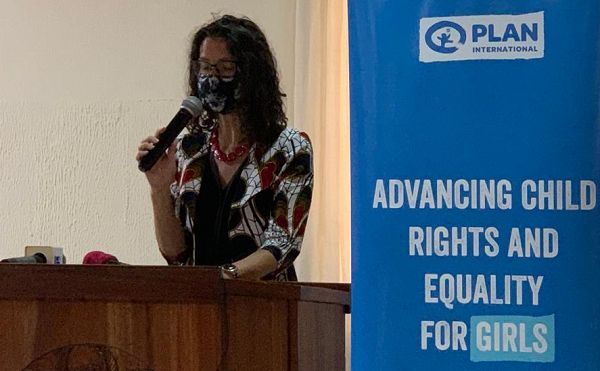The British High Commissioner to Ghana, Harriet Thompson, has stressed the need for government to adopt ICT tools to improve the quality and learning outcomes in the country.
She said the government could adopt the use of ICT tools to improve literacy and numeracy lessons, thus strengthening gender-responsive teaching and learning methods as well as providing remote education to the most marginalised children.
She said the UK government was dedicated to supporting the country in reforms and policies to improve gender equality and social inclusion in education, drive forward ICT in Education reforms, and enable the most marginalised girls to access education, learn and progress.
Ms. Thompson was speaking at a learning and dissemination event on the ‘Making Ghanaian Girls Great’ (MGCubed) project of the Plan International Ghana in Accra on Wednesday, December 8, 2021.
![]()
Background
The MGCubed is an interactive distance learning project that aimed at improving the learning outcomes of students in numeracy and literacy and ensured they transitioned to the next stage of their education by targeting the entire school ecosystem—teachers, school leaders, local policy makers, the community.
The project directly impacted 14,132 girls and 11,435 boys across 72 Basic Schools in the Greater Accra and Oti Regions of Ghana.
The overall objective of the learning and dissemination event is to reflect on the evidence from the projects, good practices and innovative approaches in the areas of gender and inclusive teaching and learning and how education technology can facilitate targeted learning and scale up.
It was also aimed at providing an opportunity for key stakeholders to share their experiences and lessons learnt during the project implementation.
The event
Similarly, the event was intended to afford the participants—stakeholders in education, the opportunity to explore how all the findings and lessons feed into existing policies and the future plans of the Ministry of Education and its agencies in leveraging on the technology that the projects are leaving behind.
Ms Thompson MGCubed was one of the three projects being sponsored by the UK government in Ghana under “Our global Girls Education Challenge - GEC - programme.”
She noted that it was important to have a resilient education system with digital channels to enable remote teaching and learning to continue “if teachers and students can’t meet face-to-face.”
She also commended Plan International Ghana, the implementing partner of the project, for its key role in the success story of the project, stressing that the project enabled students to directly access digital learning resources, additional support from a master teacher, interactive learning activities, peer support through ‘Wonder Women’ and ‘Boys Boys’ clubs, and exposure to inspiring role models.
Overview
Presenting the overview of the MGCubed Project, the Project Manager, J. Miguel Falcon Perez, said endline evaluation results showed that the project supported girls to largely maintain existing learning levels during the closure of schools as a result of the covid-19.
![]()
Similarly, he noted, the project also contributed significantly to higher girls’ transition rates, pointing out that “the success of the MGCubed Tech model resulted in its adoption for a large-scale professional teacher development through hubs created across selected colleges of education in Ghana known as the Train for Tomorrow (T4T) project.”
The T4T project, Mr Perez noted, was funded by Dubai Cares in a Phase two from 2018 to August 2021 after successfully completing a phase one from 2015 to 2018, adding that the Project was implemented through 20 colleges of education across the country directly impacting 7,959 teachers (47.5% female and 52.5% male) and indirectly benefiting 264,145 students.
He said the project was funded by the Foreign Commonwealth and Development Office (FCDO) under the Girls’ Education Challenge Phase one (GEC-1) from 2013 to 2017 and Girls’ Education Challenge – Transition (GEC-T) Phase Two from 2017 to 2021.
Impact
The Country Director of Plan International Ghana, Mr Solomon TesfaMariam, pledged the commitment of Plan Ghana to continue to invest in girls’ education.
For him, the MGCubed project has positively impacted many lives, particularly in the rural communities of the country.
![]()
“The Project has shown the importance of delivering targeted learning and life skills support to vulnerable children through the delivery of literacy and numeracy remedials and afterschool clubs during the extracurricular time,” he noted.
Mr TesfaMariam explained that over the years, Plan Ghana’s projects have generated quality content and educational resources and strategies that have proven to yield positive learning outcomes, calling for tech infrastructure and framework to enable upscaling and mainstreaming of the MGCubed project in the country.
Upscaling
A Deputy Minister of Education, Mr John Ntim Fordjour, commended Plan International Ghana and its partners for initiating the project, noting that the project has benefited many students and teachers across the country.
He said government was working tirelessly to address challenges relating to literacy and numeracy of pupils in the country.
![]()
He explained, for instance, that the government’s introduction of a standardised test for pupils in primary four was to help address learning poverty, stressing that government would scale up the MGCubed project, considering its success story.

